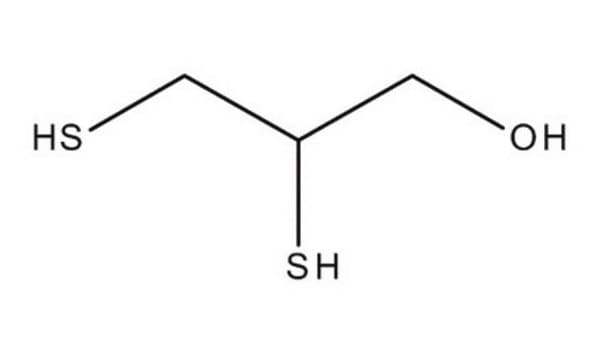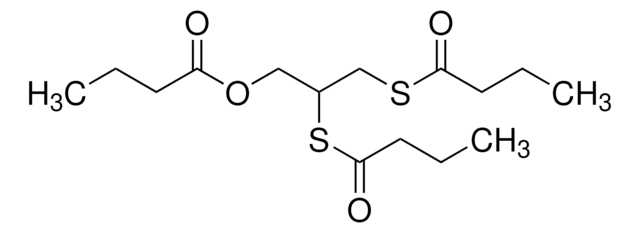64046
2,3-Dimercapto-1-propanol
≥98% (iodometric)
Synonyme(s) :
BAL, British anti-Lewisite, DMP, Dimercaprol, Dithioglycerol
About This Item
Produits recommandés
Niveau de qualité
Pureté
≥98% (iodometric)
Indice de réfraction
n20/D 1.572-1.574
n20/D 1.573 (lit.)
Point d'ébullition
120 °C/15 mmHg (lit.)
Densité
1.239 g/mL at 25 °C (lit.)
Température de stockage
2-8°C
Chaîne SMILES
OCC(S)CS
InChI
1S/C3H8OS2/c4-1-3(6)2-5/h3-6H,1-2H2
Clé InChI
WQABCVAJNWAXTE-UHFFFAOYSA-N
Vous recherchez des produits similaires ? Visite Guide de comparaison des produits
Description générale
Application
Mention d'avertissement
Danger
Mentions de danger
Conseils de prudence
Classification des risques
Acute Tox. 3 Oral - Eye Irrit. 2 - Skin Irrit. 2 - STOT SE 3
Organes cibles
Respiratory system
Code de la classe de stockage
6.1C - Combustible acute toxic Cat.3 / toxic compounds or compounds which causing chronic effects
Classe de danger pour l'eau (WGK)
WGK 3
Point d'éclair (°F)
233.6 °F - closed cup
Point d'éclair (°C)
112 °C - closed cup
Équipement de protection individuelle
Eyeshields, Faceshields, Gloves, type ABEK (EN14387) respirator filter
Certificats d'analyse (COA)
Recherchez un Certificats d'analyse (COA) en saisissant le numéro de lot du produit. Les numéros de lot figurent sur l'étiquette du produit après les mots "Lot" ou "Batch".
Déjà en possession de ce produit ?
Retrouvez la documentation relative aux produits que vous avez récemment achetés dans la Bibliothèque de documents.
Les clients ont également consulté
Notre équipe de scientifiques dispose d'une expérience dans tous les secteurs de la recherche, notamment en sciences de la vie, science des matériaux, synthèse chimique, chromatographie, analyse et dans de nombreux autres domaines..
Contacter notre Service technique












